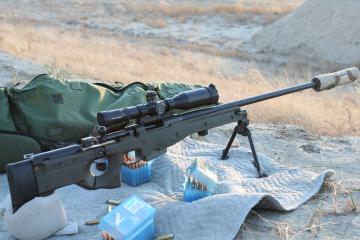Caliber Selection
Caliber selection is one of the most-debated questions about long-range shooting. There are many
good choices, and many of them will perform similarly.
There are two primary factors related to caliber which affect long-range performance. The first is the bullet's Ballistic Coefficient (BC), a measure of how easily the bullet slips through the air. Higher BC is better. The second is the muzzle velocity. Faster is better. Bullet selection is critical for long-range shooting. Select the bullet which has the highest BC possible, provided the muzzle velocity is not too low. Here is a breakdown of how different BC's rate: higher than 0.70: Best higher than 0.60: Excellent higher than 0.50: Good higher than 0.40: Merely OKOnce a high-BC bullet is selected, it's always better to shoot it faster, but there are diminishing returns faster than 3000 fps. Bullet weight combined with muzzle velocity tend to indicate "overbore" calibers-- cartridges which have a high proportion of powder to bore area. This measure is important because overbore calibers wear out barrels faster than calibers which use less powder. For example, .300 Winchester Magnum has more powder capacity than .308 Winchester, but both can shoot the same bullets. The .300 will wear out a barrel faster than the .308.
The baseline caliber choice is .308 Winchester. It shoots a 0.51 BC bullet at 2650 - 2850 fps, and has very long barrel life (8000+ rounds). Recoil is mild. Factory "match" ammunition is available everywhere for reasonable prices. Calibers with better long-range performance will have the liabilities of: more expensive ammunition, shorter barrel life, increased blast and recoil, and in some cases the necessity of reloading. To achieve better long-range performance, the velocity or BC must be improved. For long-range performance, generally bullets that are "heavy" for the caliber will provide the best BC, but this is not always true when comparing bullets of different design.
Caliber Preferred Bullet Weight Velocity
* 6mm:
243 Winchester 107-115gr, 3000-3100fps
6XC 107-115gr, 2850-2950fps
* 6.5mm:
260 Remington 120-142gr, 2700-3000fps
260 Remington Ackley 139-142gr, 2850-2950fps
6.5-284 Norma 139-142gr, 2950-3050fps
* 7mm:
7mm Remington Magnum 162-180gr, 2900-3050fps
7mm WSM 162-180gr, 2850-3000fps
284 Winchester 150-168gr, 2700-2800fps
280 Remington 162-180gr, 2750-2860fps
* .30:
.30-06 175-210gr, 2660-2960fps
.300 Winchester Magnum 190-210gr, 2850-3050fps
.300 WSM 175-210gr, 2750-3000fps
* .338
.338 Lapua Magnum 250-300gr, 2700-3000fps
If you can only have one long-range precision rifle, it should be in .308 Winchester. Match-grade .308
ammunition is available everywhere, reloading recipes are well known and reloading it is easy, and
in many rifles, the surplus 7.62x51 NATO ammunition from some countries will shoot 1.5 MOA or
better, which is good enough for short-range (400 yards and closer) practice from less steady
shooting positions such as offhand, kneeling, over barricades, or shooting at movers.
I am going to recommend three other calibers to use for practical long-range shooting. The first is .260 Remington. It fits in the same rifles and actions as 308, but has less recoil and superior external ballistics. The second is 7mm Remington Magnum. The last is .338 Lapua Magnum. There are a lot of other calibers that perform well at long range, but these additional three provide good stepping points of increased performance. The Magnum calibers such as 7RM, 300WM, and 338 Lapua will provide improved ballistics, but at the expense of ammunition cost, barrel life, and increased recoil. The box magazines for these calibers hold fewer rounds than the short-action .308-based calibers. Follow-up shots will be slower due to the increased recoil and bolt cycling distance. |

